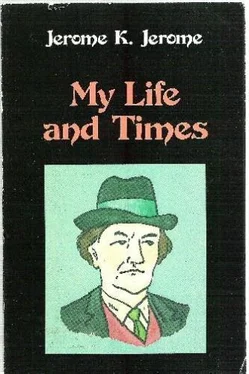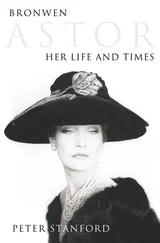So ends my childhood. It remains in my memory as quite a happy time. Not till years later did I learn how poor we were—of the long and bitter fight that my father and mother were waging against fate. To me it seemed we must be rather fortunate folk. We lived in the biggest house in Sussex Street. It had a garden round three sides of it with mignonette and nasturtiums that my mother watered of an evening. It was furnished more beautifully, I thought, than any house I had ever seen, with china and fine pictures and a semi-grand piano by Collard and Collard in the drawing-room, and damask curtains to the windows. In the dining-room were portraits of my father and mother by Muirhead, and when visitors came my mother would bring out the silver teapot and the old Swansea ware that she would never let anyone wash but herself. We slept on mahogany bedsteads, and in my father's room stood the Great Chest. The topmost drawer was always locked; but one day, when the proper time arrived, my father would open it, and then we should see what we would see. Even my mother confessed she did not know—for certain—what was hidden there. My father had been a great man and was going to be again. He wore a silk hat and carried a walking-stick with a gold head. My mother was very beautiful, and sometimes, when she was not working, wore silks and real lace; and had an Indian shawl that would go through a wedding-ring. My sisters could sing and play and always wore gloves when they went out. I had a best suit for Sundays and visitings; and always enough to eat. I see from my mother's diary that one of her crosses was that for a growing boy I was not getting proper nourishing food, but of this I had no inkling. There was a dish called “bread and sop” which was sweet and warm and of which I was fond. For tea there would sometimes be golden syrup, and for supper bread with dripping spread quite thick. And on Sundays we had meat and pudding for dinner. If all things are as my mother so firmly believed, she has long known that her fears were idle—that notwithstanding I grew up to be an exceptionally strong and healthy man. But I would that the foreknowledge could have come to her when she was living, and so have removed one, at least, of her many sorrows.
Chapter II
I BECOME A POOR SCHOLAR
One of the advantages of being poor is that it necessitates the cultivation of the virtues. I learnt to get up early in the morning—the beginning of all things that are of good repute. From Sussex Street to Poplar station on the North London Railway I found to be a quarter of an hour's sharp walking. So I breakfasted at half-past six, and caught the seven-fifteen. The seven-thirty would have done it. But my father's argument was: “Better catch the seven-fifteen. Then, if you miss it, the seven-thirty will still get you there in time. But if you catch the seven-thirty, then if you don't, you're done.” The train wound round Bow and Homerton, then a leafy neighbourhood of market gardens and old wooden houses. At Homerton still stood Dick Turpin's house, a substantial, comfortable-looking dwelling, behind a pleasant, walled-in garden, celebrated even then for its wonderful godetias, said to have been Dick Turpin's favourite flower. At Dalston Junction one changed, and went on through Highbury and old Canonbury to Chalk Farm. From there my way lay by Primrose Hill and across Regent's Park. Primrose Hill then was on the outskirts of London, and behind it lay cottages and fields. I remember a sign-post pointing out a footpath to Child's Hill and the village of Finchley. Sometimes of a morning I was lucky enough to strike a carriage going round the outer circle of the park, and would run after it and jump on to the axle-bar. But clinging on was ticklish work, especially when handicapped by a satchel and an umbrella; added to which there was always the danger of some mean little cuss pointing from the pavement and screaming “Whip behind,” when one had to spring off quickly, taking one's chance of arriving upon one's feet or on one's sitting apparatus. School hours were from nine till three; and with luck I would catch the quarter to four from Chalk Farm and get back home at five. Then there would be tea, which was my chief meal of the day; and after that I would shut myself up in my small bedroom—in the winter with a blanket wrapped round me—and get to work on my home lessons. Often they would take me until ten or eleven o'clock, and difficulty enough I had to keep myself awake.
It was a silly system; and in most schools it still continues. But I do not propose to dwell upon my school life. It makes me too angry, thinking about it. Education is the most important thing in the world, and the most mismanaged: which accounts for the continued low intelligence of the human race. Carlyle's definition of school is a place of torment where youth is confined behind windowless walls and has books flung at it. If only they would fling the right books, it would be something. What a boy learns in six years at school, he could, With the aid of an intelligent bookseller, learn at home in six months. Whatever knowledge I possess I picked up for myself in later years. To the British Museum reading-room, with its courteous officials, I remain grateful; though, on the principle of making the punishment fit the crime, the party responsible for its heating arrangements ought to be suffocated. To the Young Men's Christian Association—not yet then affiliated to the Standard Oil Trust—I return thanks. But still more am I indebted to shabby, care-worn ladies and gentlemen, their names forgotten, who, for a sadly inadequate fee of sixpence to ninepence an hour, put their fine learning at my disposal.
I am not blaming my own particular school. A French proverb has it that in all things a man's choice lies, not between the good and the bad, but between the bad and the worse. Looking back, I am inclined to regard my dear father's selection—whether of chance or necessity—as one of the least worse. In one respect it might be cited as a model. Corporal punishment was never employed. Without it, excellent discipline was maintained among three hundred chance assorted youngsters, Tradition was relied upon. Philological boys did not have to be beaten before they would behave themselves. If a boy proved to be outside the method, he was expelled. During the five years that I was there, only three boys had to be shown out.
Man is born sinful. One does not have to accept literal interpretation of the Book of Genesis to be convinced of it. The Manicheans maintain that the world, including man, was Devil created; and evidence can be adduced in support of their theory. There are times when even one's better feelings incline one to the argument of the blow. There is no fiercer opponent of the stick than Bernard Shaw. He and Zangwill were taking a walk. They noticed a group of boys in a field with their heads close together. When two or three country boys are gathered together, and seem to be interested, one is justified in thinking evil. Observation confirmed suspicion. An animal's shrill cry of pain came from the centre of the group. Shaw, gripping his walking-stick, vaulted the gate. The boys let go their victim and fled: Shaw in full chase. “The young imps of Satan”—to adopt the language of a passing labourer—had the start and proved fleet of foot. Shaw returned panting; explaining in heated language what he had intended to do, if only he had overtaken them.
“But I thought,” said Zangwill, “that you were opposed to all physical punishment.”
“So I am,” growled Shaw. “But I have never claimed to be consistent.”
Justice may occasionally condone the whip; but the long martyrdom inflicted upon youth in the name of Education shows human nature in an ugly light. All cruelty has its roots in lust. The boy has been beaten, one fears, not for his own good, but for the pleasure of the Domini. When magisterial gentlemen pass eulogisms on the rod, and old club fogies write to the papers fond recollections of the birch, I have my doubts. They like to think about it.
Читать дальше










